N2能力考模拟卷
俄语二级模拟考试题答案
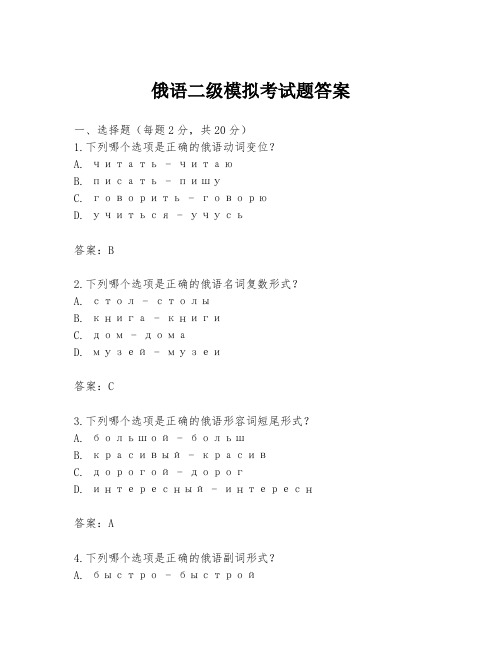
俄语二级模拟考试题答案一、选择题(每题2分,共20分)1.下列哪个选项是正确的俄语动词变位?A. читать - читаюB. писать - пишуC. говорить - говорюD. учиться - учусь答案:B2.下列哪个选项是正确的俄语名词复数形式?A. стол - столыB. книга - книгиC. дом - домаD. музей - музеи答案:C3.下列哪个选项是正确的俄语形容词短尾形式?A. большой - большB. красивый - красивC. дорогой - дорогD. интересный - интересн答案:A4.下列哪个选项是正确的俄语副词形式?A. быстро - быстройB. хорошо - хорошомC. медленно - медленнойD. далеко - далекой答案:D5.下列哪个选项是正确的俄语动词将来时形式?A. я буду читатьB. ты будете писатьC. мы будем говоритьD. они будут учиться答案:D6.下列哪个选项是正确的俄语数词形式?A. один - два - триB. одиннадцать - двенадцать - тринадцатьC. двадцать - тридцать - сорокD. пятьдесят - шестьдесят -семьдесят答案:C7.下列哪个选项是正确的俄语代词形式?A. я - мы - выB. это - это - этоC. кто - что - чтоD. мой - твой - его答案:D8.下列哪个选项是正确的俄语前置词用法?A. в + 六格 - 表示在...里面B. на + 六格 - 表示在...上面C. с + 六格 - 表示从...开始D. по + 六格 - 表示通过...答案:A9.下列哪个选项是正确的俄语连接词用法?A. и - 表示“和”B. или - 表示“或者”C. но - 表示“但是”D. а - 表示“而”答案:C10.下列哪个选项是正确的俄语动词命令式形式?A. читайB. пишиC. говориD. учись答案:A二、填空题(每题2分,共20分)1. Вчера я _____(买)книгу.答案:купил2. Мы _____(去)в театр.答案:пошли3. Она _____(做)домашнее задание.答案:делает4. Они _____(看)телевизор.答案:смотрят5. Вы _____(读)газету?答案:читаете6. _____(谁)это делает?答案:Кто7. _____(什么)вы хотите купить?答案:Что8. Я _____(不)знаю ответ.答案:не9. _____(多少)стоит эта книга?答案:Сколько10. _____(为什么)вы не пришли?答案:Почему三、阅读理解(每题2分,共20分)阅读下面的短文,然后回答问题。
考研英语二模拟测评三试卷及答案

英语(二)模拟试题(三)Section I Use of EnglishDirections:Read the following text. Choose the best word(s) for each numbered blank and mark A, B, C or D on ANSWER SHEET . (10 points)Facebook has been 1 with fire and has got its fingers burned, again. On November 29th America’s Federal Trade Commission (FTC) announced that it had reached a 2 settlement with the giant social network over 3 that it had misled people about its use of their personal data.The details of the settlement make clear that Facebook, which 4 over 800m users, betrayed its users’ trust. It is also notable because it appears to be part of a broader 5 by the FTC to craft a new privacy framework to deal with the rapid 6 of social networks in America.The regulator’s fin dings come at a 7 moment for Facebook, which is said to be preparing for an initial public offering next year that could value it at around $100 billion. To 8 the way for its listing, the firm first needs to resolve its privacy 9 with regulators in America and Europe. 10 its willingness to negotiate the settlement 11 this week.Announcing the agreement, the FTC said it had found a number of cases where Facebook had made claims that were “unfair and deceptive, and 12 federal law”. For insta nce, it 13 personally identifiable information to advertisers, and it failed to keep a promise to make photos and videos on deleted accounts 14 .The settlement does not 15 an admission by Facebook that it has broken the law, but it deeply 16 the company nonetheless. In a blog post published the same day, Mark Zuckerberg, Facebook’s boss, tried to17 the impact of the deal. First he claimed that “a small number of high-profile mistakes” were 18 the social network’s “good history” on pri vacy.The FTC is not relying on Facebook to police itself. Among other things, the company will now have to seek consumers’ approval before it changes the way it shares their data. And it has agreed to an independent privacy audit every two years for the next 20 years.There is a clear pattern here. In separate cases over the past couple of years the FTC has insisted that Twitter and Google accept regular 19 audits, too, after each firm was accused of violating its customers’ privacy. The intent seems to be to create a regulatory regime that is tighter than the status quo, 20 one that still gives social networks plenty of room to innovate.1. [A] setting [B] playing [C] lighting [D] turning2. [A] craft [B] documentary [C] trade [D] draft3. [A] verdicts [B] allegations [C] rumors [D] affirmation4. [A] boasts [B] exaggerates [C] estimates [D] assesses5. [A] impulse [B] initiative [C] innovation [D] motion6. [A] increase [B] elevation [C] rise [D] appearance7. [A] indispensable [B] essential [C] critical [D] fundamental8. [A] steer [B] clear [C] lay [D] remove9. [A] controversy [B] competition [C] dispute [D] compromise10. [A] despite [B] given [C] although [D] hence11. [A] unveiled [B] discovered [C] exposed [D] revealed12. [A] violated [B] assaulted [C] resisted [D] betrayed13. [A] informed [B] entrust [C] imparted [D] confided14. [A] available [B] retrievable [C] reversible [D] inaccessible15. [A] constitute [B] correspond [C] confirm [D] conceive16. [A] involves [B] strikes [C] embarrasses [D] attacks17. [A] turn down [B] cut down [C] play down [D] bring down18. [A] overshadowing [B] overlooking [C] overtaking [D] overthrowing19. [A] expert [B] external [C] formal [D] automatic20. [A] and [B] but [C] thus [D] despiteSection II Reading ComprehensionPart ADirections :Read the following four passages. Answer the questions below each text by choosing A, B, C, or D. Mark your answers on ANSWER SHEET .(40 points)Text 1Most American movies are produced in Hollywood, California. Hollywood, which is actually not a separate city but a part of Los Angeles, is an ideal spot for the movie industry. The sun shines most of the time, and the climate is mild. Almost every kind of natural scenery is within a few hours’ drive.Hollywood becomes the center of national attention one evening a year-Academy Award night. At the Academy Award presentation held each spring, statuettes called Oscars are given to film industry winners in dozens of categories, including best actor, best actress, and best picture. The winners are chosen by members of the industry before the ceremony, but their names are kept secret until presentation night, when they are announced in a long, nationally televised program.Motion pictures were extremely popular in the United States after World War II, when television captured much of the movie audience. Geared to the masses, Hollywood movies offered much the same type of entertainment as television does. With free entertainment in their homes, many Americans simply stopped going to movies. Between 1946 and 1956, movie attendance was cut in half. At the same time, production costs zoomed. The movie industry was in trouble.The industry adjusted itself in a number of ways. Movie companies rented sound stages to TV companies and sold old movies to TV. To cut costs, Hollywood produced fewer movies and filmed many of them overseas. To lure audiences, the industry invested in new lenses, wider screens, and stereophonic sound. Studios also began producing kinds of entertainment that could not be offered by TV-films with controversial or shocking themes, films with huge casts and lavish settings. As a result of these changes, today the American motion picture industry is thriving.21.What makes Hollywood a great place for American movie industry according to the passage?[A] A famous part of Los Angeles[B] Favorable natural and traffic conditions[C] Natural scenery with mild climate and the shining sun[D] A great industrial base of American22.Which one about Oscars is correct according to the passage?[A] It is the name of a great film figure[B] It is given to World Academy Award in America each year[C] It is a yearly honor to winners in movie industry[D] It doesn’t produce until Academy Award night in each spring23.Why did many Americans like entertaining in homes instead of going to cinema after World War II?[A] Because the quality of film was becoming worse and worse[B] Because Hollywood movies couldn’t offer entertainment similar to television[C] Because the movie industry was in trouble for expensive production cost[D] Because TV’s popularity made them enjoy without paying24.What does the word “zoomed” (in the last sentence of the third paragraph) mean?[A] Moved along very quickly[B] Rose upward into the air[C] Increased high in price[D] Moved with a low humming noise25.The movie industry tried many methods to lure audiences except__________.[A] building commercial relationship with TV companies[B] improving its basic equipment[C] producing films with famous stars in low cost[D] offering types of entertainment different from TVText2The Arctic Ocean has given up tens of thousands more square kilometers of ice in a relentless summer of melt, with scientists watching through satellite eyes for a possible record low polar ice cap.From the barren Arctic shore of a village in Canada’s far northwest, veteran observer Eddie Gruben has seen the summer ice retreating more each decade as the world has warmed. By this weekend the ice edge lay 128 kilometers at sea, but forty years ago, it was 64 kilometers out. Global average temperatures rose 1 degree Fahrenheit in the past century, but Arctic temperatures rose twice as much or even faster, almost certainly in large part because of manmade greenhouse gases, researchers say. In late July the mercury soared to almost 86 degrees Fahrenheit in this settlement of 900 Arctic Eskimos.As of Thursday, the U.S. National Snow and Ice Date Center reported, the polar ice cap extended over 6.75 million square kilometers after having shrunk an average 106,000 square kilometers a day in July—equivalent to one Indiana or three Belgiums daily. The rate of melt was similar to that of July 2007, the year when the ice cap dwindled to a record minimum extent of 4.3 million square kilometers in September. In its latest analysis, NSIDC said Arctic atmospheric conditions this summer have been similar to those of the summer of 2007, including a high-pressure ridge that produced clear skies and strong melt in the Beaufort Sea, the arm of the Arctic Ocean off northern Alaska and northwestern Canada.Scientists say the makeup of the frozen polar sea has shifted significantly the past few years,as thick multiyear ice has given way as the Arctic’s dominant form to thin ice that comes and goes with each winter and summer. The past few years have “signaled a fundamental change in the character of the ice and the Arctic climate,” Meier said. Ironically, the summer melts since 2007 appear to have allowed disintegrating but still thick multiyear ice to drift this year into the relatively narrow channels of the Northwest Passage. Usually, impassable channels had been relatively ice-free the past two summers.Observation satellites’remote sensors will tell researchers in September whether the polar cap diminished this summer to its smallest size on record. Then the sun will begin to slip below the horizon for several months, and temperatures plunging in the polar darkness will freeze the surface of the sea again, leaving this and other Arctic coastlines in the grip of ice. Most of the sea ice will be new, thinner and weaker annual formations, however.At a global conference last March in Copenhagen, scientists declared that climate change is occurring faster than had been anticipated, citing the fast-dying Arctic cap as one example. A month later, the U.S. National Oceanic and Atmospheric Administration predicted Arctic summers could be almost ice-free within 30 years, not at the century’s end earlier predicted.26.The word “retreating” (Line2, Paragraph2) most probably means________.[A] withdrawing [B] moving back[C] melting [D] treating again27.We may infer from Paragraph 2 and 3 that____________.[A] rising Arctic temperatures result completely from manmade greenhouse gases[B] the summer ice edge was 192 kilometers at sea 40 years ago[C] the polar ice cap was over 6.87million square kilometers in July[D] the ice cap reduced to a record low minimum extent in July28.We may know that summer melts made____________.[A] some impassable channels covered by ice[B] no contribution to the makeup change of polar ice[C] thin ice become multiyear ice[D] the world climate change its character29.We learn from the last two paragraphs that____________.[A] scientists predicted future climate changes accurately[B] the polar cap diminished this summer to its smallest size on record[C] the future ice may be annually formed thinness[D] Arctic summers couldn’t be ice-free until next century30.Which of the following is the best title for this text?[A] Arctic ice lowers to its smallest size[B] Arctic ice disappears under summer sun[C] Why Arctic ice disappears soon[D] Arctic ice closely relates to climate changesText3The classic American identity theft scam works like this: the thief convinces some bank or credit card company he’s actually you and borrows God knows how many dollars in your name. Once you discover and report this, you’re not liable for money the bank lost, but neither are you entitled to compensation for the time and effort you spend straightening the matter out. Bear inmind that when I say “the thief convinces the bank he’s you”, I’m not talking about a brilliant actor and master of disguise who imitates your voice and mannerisms well enough to fool your own mother. No, all that’s necessary to fool a bank is your birth date and US social security number, or just discarded credit card offer taken from your bin.Why are lenders so careless with their money? The snarky answer is: because they know taxpayers will bail them out. But identity theft was a problem in America long before phrases like “too big to fail” entered our vocabulary. I became an identity-theft statistic nine years ago, when I opened my mail to find a bill for a maxed- out credit card I never knew I had. I spent over two weeks cleaning the mess: filing police reports, calling the company, sitting on hold, getting disconnected and calling back to sit on hold again. Considering my salary back then, I spent over a thousand dollars’ worth of my time and wasn't entitled to a penny in damages.It all could easily have been avoided, had the company made a minimal effort to ensure they were loaning money to me rather than my dishonest doppelganger. So why didn't they? Because that would take time -at least a day or two. And if people had to wait a day between applying for and receiving credit, on-the-spot loans would be impossible. Every major retail chain in America pushes these offers: “Apply for a store credit card and receive 15% off your first purchase!” From the lenders’ perspective, writing off a few bad ID-theft debts is cheaper than losing the lucrative “impulse buyer” market.But that would change if companies had to pay damages to identity theft victims. Should they have to? The supreme court of the state of Maine is currently pondering that question. In March 2008 the Hannaford supermarket chain announced that hackers broke into their database and stole the credit card information of over 4 million customers, some of whom sued Hannaford for damages. None of the customers lost money, of course, but they felt-as I did-that their time and effort are worth something too.It’s too early to know how the court will rule, but I’ll make a prediction anyway: nothing will change from the consumers’ perspective, and protecting lenders from their own bad habits will continue to be our unpaid job. When the worldwide economic meltdown started, I naively thought the subsequent tightening of credit lines would at least make identity theft less of a problem than before. But I was just being silly.31.After suffering from identity theft, you_____________.[A] should pay for money the bank lost[B] are required to report to your bank immediately[C] have to assume the cost of getting your identity back[D] won’t have to take any loss caused by it32.What’s the real meaning of “too big to fail” in para. 2?[A] Leaders are so big that they couldn’t fail at all.[B] Leaders won’t pay for their loaning carelessness.[C] Leaders are big enough to pay for any large loans.[D] America is big enough to solve any problems.33. The 3rd paragraph mainly talks about___________.[A] Why companies take efforts to avoid identity theft[B] The reason of companies’ effortlessness to h elp avoid identity theft[C] The reason of taking time to solve the problem of identity theft[D] The cause of companies offering on-the-spot loans34. The example in the 4th paragraph is cited to show that________.[A] Companies have paid for damages to identity theft victims[B] Customers often suffer from identity theft in America[C]Companies should be responsible for identity theft[D]Companies often suffer from identity theft in America35. What’s the author’s attitude to current solutio ns to identity theft?[A] Disappointed [B] Confident[C] Complicated [D] OptimisticText4Death is a difficult subject for anyone, but Americans want to talk about it less than most. They have a cultural expectation that whatever may be wrong with them, it can be fixed with the right treatment, and if the first doctor does not offer it they may seek a second, third or fourth opinion. Legal action is a constant threat, so even if a patient is very ill and likely to die, doctors and hospitals will still persist with aggressive treatment, paid for by the insurer or, for the elderly, by Medicare. That is one reason why America spends 18% of its GDP on health care, the highest proportion in the world.That does not mean that Americans are getting the world's best health care. For the past 20 years doctors at the Dartmouth Institute for Health Policy and Clinical Practice have been compiling the “Dartmouth Atlas of Health Care”, using Medicare data to compare health-spending patterns in different regions and institutions. They find that average costs per patient during the last two years of life in some regions can be almost twice as high as in others, yet patients in the high-spending areas do not survive any longer or enjoy better health as a result.Ira Byock is the director of palliative medicine at Dartmouth-Hitchcock Medical Center. His book is a plea for those near the end of their life to be treated more like individuals and less like medical cases on which all available technology must be let loose. With two decades' experience in the field, he makes a good case for sometimes leaving well alone and helping people to die gently if that is what they want.That does not include assisted suicide, which he opposes. But it does include providing enough pain relief to make patients comfortable, co-coordinating their treatment among the different specialists, keeping them informed, having enough staff on hand to see to their needs, making arrangements for them to be cared for at home where possible—and not officiously keeping them alive when there is no hope.But it is not easy to decide when to stop making every effort to save someone's life and allow them to die gently. The book quotes the case of one HIV-positive young man who was acutely ill with multiple infections. He spent over four months in hospital, much of the time on a ventilator, and had countless tests, scans and other interventions. The total bill came to over $1m. He came close to death many times, but eventually pulled through and has now returned to a normal life. It is an uplifting story, but such an outcome is very rare.Dr Byock's writing style is not everybody's cup of tea, but he is surely right to suggest better management of a problem that can only get worse. As life expectancy keeps on rising, so will the proportion of old people in the population. And with 75m American baby-boomers now on the threshold of retirement, there is a limit to what the country can afford to spend to keep them going on and on.36. According to Paragraph 1, the disproportional large spending in health care stems from[A] Americans' failure to admit death as part of their life[B] doctors' inclination to overtreat the patient[C] a culture that is obsessed with youth and health[D] a legal system which has a bias in favor of patients37. The author cited the findings of Dartmouth Institute for Health Policy and Clinical practice to illustrate that[A] the medical care quality differs widely from region to region[B] there is little that hospitals can do in saving people's lives[C] a lot of medical resources are wasted[D] the American medical system is notorious for its low cost-effectiveness38. The central idea of Ira Byock's book is to appeal to the hospital to[A] save every life with every possible means[B] help people to die if that is his/her will[C] make people feel comfortable in their remaining hours[D] consider whether the cure is worthwhile before conducting it39. In the author's opinion the example of the HIV-positive young man in Paragraph 5[A] eliminates the possibility of applying gentle dying process in medicare[B] is merely an extreme case that should not be taken as a standard[C] emphasizes the importance of aggressive treatment even with slim hope[D] is used as an irony of the current state of American medical system40. According to the author, the American government will the proposal of gentle dying[A] disapprove of [B] divide at[C] hesitate at [D] side withPart BDirections:Reading the following text and answer the questions by finding a subtitle for each of the marked parts or paragraphs. There are two extra items in the subtitles. Mark your answers on the ANSWER SHEET.(10 points)[A] Convincing evidence: US is losing its appeal in the eyes of multinationals[B] Biggest hindrance: US divided political system[C] American future: stuck in the middle[D] Overstated statement: US overall competitiveness is declining[E] V oice of experts: pessimism pervades academic world[F] Economic outlook: bad but not desperate[G] Undisputed fact: US is losing its economic edge41.Is America fading? America has been gripped by worries about decline before, notably in the 1970s, only to roar back. But this time it may be serious. There is little doubt that other countries are catching up. Between 1999 and 2009 America’s share of world exports fell in almost every industry: by 36 percentage points in aerospace, nine in information technology, eight in communications equipment and three in cars. Private-sector job growth has slowed dramatically,and come to a halt in industries that are exposed to global competition. Median annual income grew by an anemic 2% between 1990 and 2010.42.The March issue of the Harvard Business Review is devoted to “American competitiveness”. The Review reports that declinism is prevalent among HBS alumni: in a survey, 71% said that American competitiveness would decline in the coming years.43.America is losing out in the race to attract good jobs. Matthew Slaughter of Dartmouth’s Tuck School of Business points out that multinational firms increased employment in America by 24% in the 1990s. But since then they have been cutting back on jobs in America. They have moved dull repetitive tasks abroad, and even some sophisticated ones, too. The proportion of the employees of American multinationals who work for subsidiaries abroad rose from 21.4% in 1989 to 32.3% in 2009. The share of research-and-development spending going to foreign subsidiaries rose from 9% in 1989 to 15.6% in 2009; that of capital investment rose from 21.8% in 1999 to 29.6% in 2009.44.America’s poli tical system comes in for particularly harsh criticism: 60% of HBS alumni said that it was worse than those in other advanced countries. David Moss of HBS argues that such complaints are nothing new: American politicians have been squabbling about the role of government ever since Thomas Jefferson butted heads with Alexander Hamilton. But in the past this often led to fruitful compromises. But such compromises are rarer these days. Republicans and Democrats are more ideologically divided, and less inclined to make pragmatic concessions.45.For all this gloom, the Review’s gurus argue that, as Bill Clinton said in his first inaugural address, there is nothing wrong with America that cannot be cured by what is right with America. The country has huge strengths, from its world-beating universities to its tolerance of risk-taking. It has a highly diverse market: firms that seek cheap labour can move to Mississippi, where wages are a third lower than those in Massachusetts. Rosabeth Moss Kanter of HBS points to the extraordinary amount of innovation that is going on not just in Silicon Valley but across the country.Yet it is difficult to read this collection of essays without a sense of foreboding. The one thing that worries the HBS alumni more than anything else—the state of American politics—is the most difficult to fix. The political pendulum swings unpredictably, making it hard to plan for the future. Should companies assume that they will have to abide by Mr Obama’s health-care law when it comes into effect in 2014, or will the Republicans have repealed it by then? No one knows.Section III Translation46. Direction:Translate the following text from English into Chinese. Write your translation on the ANSWER SHEET . (15 points)Age has its privileges in America, and one of the more prominent of them is senior citizen discount.Anyone who has reached a certain age is automatically entitled to dazzling array of price reductions at nearly every level of commercial life. Practically unheard of a generation ago, thediscounts have become a routine part of many businesses- as common as color televisions in motel rooms and free coffee on airliners.People with gray hair often are given the discounts without even asking for them; yet, millions of Americans above age 60 are healthy. Businesses that would never dare offer discounts to college students or anyone under 30 freely offer them to older Americans. Perhaps the practice once was true, but today elderly Americans as a group have a lower poverty rate than the rest of the population.To be sure, there is economic diversity within the elderly, and many older Americans are poor. But most of them aren’t.Section IV WritingPart A47.Directions:John, one of your friends, failed in the last CET-6 and is upset. Write a letter to him to1) express your pity, point out the reason for his failure,2) encourage him, and suggest a better way to prepare the exam.You should write about 100 words on ANSWER SHEETDo not sign your own name at the end of the letter. Use “Zhang Wei”instead.Do not write the address. (10 points)Part B48.Directions:In this section,you are asked to write an essay based on the following table,in which you should1)describe the table,2)state your opinions drawn from it.You should write about 150 words on the ANSWER SHEET. (15 points)Section I Use of English1 - 5 BDBAB 6 - 10 CCBCD11-15 AACDA 16-20 CCABBSection II Reading ComprehensionPart A21-25 B C D C C 26-30 C B A C B31-35 C B B C A 36-40 A C C B DPart B41-45 GEABFSection III Translation在美国,年龄就是特权,其中比较突出的一项就是老年折扣。
日语二级模拟题及答案
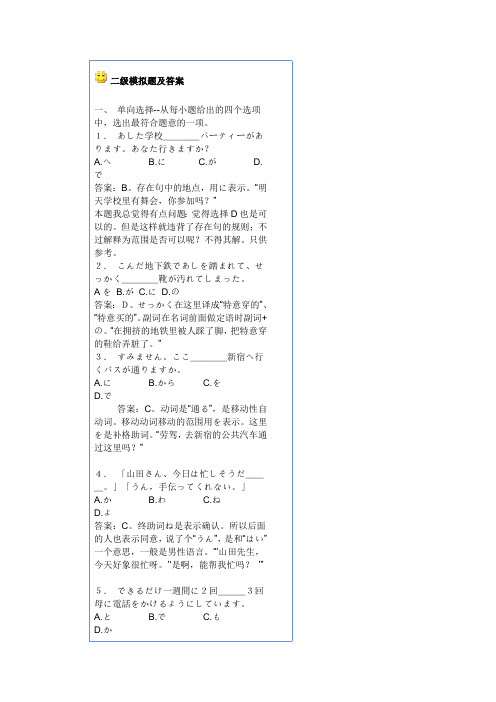
二级模拟题及答案一、单向选择--从每小题给出的四个选项中,选出最符合题意的一项。
1.あした学校____パーティーがあります。
あなた行きますか?A.へB.にC.がD.で答案:B。
存在句中的地点,用に表示。
“明天学校里有舞会,你参加吗?”本题我总觉得有点问题:觉得选择D也是可以的。
但是这样就违背了存在句的规则;不过解释为范围是否可以呢?不得其解。
只供参考。
2.こんだ地下鉄であしを踏まれて、せっかく____靴が汚れてしまった。
AをB.がC.にD.の答案:D。
せっかく在这里译成“特意穿的”、“特意买的”。
副词在名词前面做定语时副词+の。
“在拥挤的地铁里被人踩了脚,把特意穿的鞋给弄脏了。
”3.すみません。
ここ____新宿へ行くバスが通りますか。
A.にB.からC.をD.で答案:C。
动词是“通る”,是移动性自动词。
移动动词移动的范围用を表示。
这里を是补格助词。
“劳驾,去新宿的公共汽车通过这里吗?”4.「山田さん、今日は忙しそうだ___。
」「うん,手伝ってくれない。
」A.かB.わC.ねD.よ答案:C。
终助词ね是表示确认。
所以后面的人也表示同意,说了个“うん”,是和“はい”一个意思,一般是男性语言。
“…山田先生,今天好象很忙呀。
‟…是啊,能帮我忙吗?‟”5.できるだけ一週間に2回___3回母に電話をかけるようにしています。
A.とB.でC.もD.か答案:D。
2回或者3回,用か表示。
“我尽量做到每周给母亲打2次或者3次电话。
”6.教室を片付ける____ずいぶん時間がかかった。
A.のにB.のでC.からD.でも答案:A。
这里的のに是形式体言の+补格助词に,表示:对于……。
表示行为的目的。
因为教室を片付ける是动宾结构,所以要加形式体言の,变成名词接に。
“为了收拾教室,花了相当长的时间。
”7.タバコの火____火事を起こすことが多い。
A.までB.だけC.のでD.から答案:D。
から表示“从”,前面接名词。
“从烟头的火引起火灾是很多的(常有的事。
【免费下载】12月日语能力考N2真题及答案解析
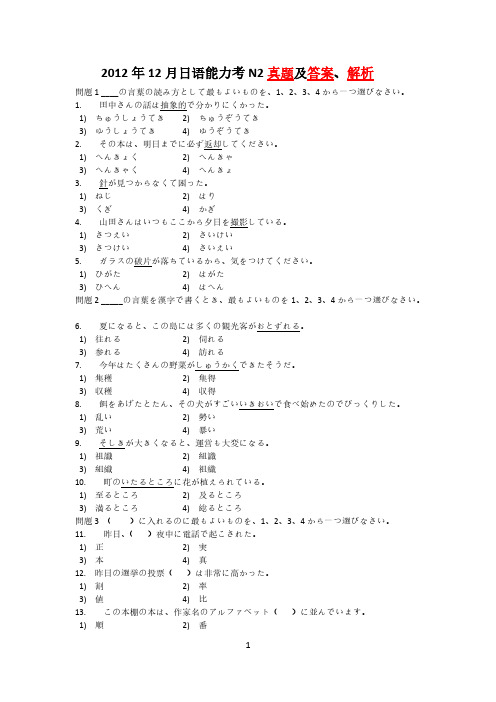
4) 健康のために、たばこを廃止するよう家族に言われた。
29. 心強い
1) 姉は心強くて、どんなにつらいことがあっても涙を見せない。
2) 初めてのプレゼンで不安だったが、先輩が一緒だったので心強かった。
3) アメリカに 10 年住んでいたので、英語はわりと心強いです。
对全部高中资料试卷电气设备,在安装过程中以及安装结束后进行高中资料试卷调整试验;通电检查所有设备高中资料电试力卷保相护互装作置用调与试相技互术关,系电,力根保通据护过生高管产中线工资敷艺料设高试技中卷术资配,料置不试技仅卷术可要是以求指解,机决对组吊电在顶气进层设行配备继置进电不行保规空护范载高与中带资负料荷试下卷高总问中体题资配,料置而试时且卷,可调需保控要障试在各验最类;大管对限路设度习备内题进来到行确位调保。整机在使组管其高路在中敷正资设常料过工试程况卷中下安,与全要过,加度并强工且看作尽护下可关都能于可地管以缩路正小高常故中工障资作高料;中试对资卷于料连继试接电卷管保破口护坏处进范理行围高整,中核或资对者料定对试值某卷,些弯审异扁核常度与高固校中定对资盒图料位纸试置,.卷编保工写护况复层进杂防行设腐自备跨动与接处装地理置线,高弯尤中曲其资半要料径避试标免卷高错调等误试,高方要中案求资,技料编术试5写交卷、重底保电要。护气设管装设备线置备4高敷动调、中设作试电资技,高气料术并中课3试中且资件、卷包拒料中管试含绝试调路验线动卷试敷方槽作技设案、,术技以管来术及架避系等免统多不启项必动方要方式高案,中;为资对解料整决试套高卷启中突动语然过文停程电机中气。高课因中件此资中,料管电试壁力卷薄高电、中气接资设口料备不试进严卷行等保调问护试题装工,置作合调并理试且利技进用术行管,过线要关敷求运设电行技力高术保中。护资线装料缆置试敷做卷设到技原准术则确指:灵导在活。分。对线对于盒于调处差试,动过当保程不护中同装高电置中压高资回中料路资试交料卷叉试技时卷术,调问应试题采技,用术作金是为属指调隔发试板电人进机员行一,隔变需开压要处器在理组事;在前同发掌一生握线内图槽部纸内故资,障料强时、电,设回需备路要制须进造同行厂时外家切部出断电具习源高题高中电中资源资料,料试线试卷缆卷试敷切验设除报完从告毕而与,采相要用关进高技行中术检资资查料料和试,检卷并测主且处要了理保解。护现装场置设。备高中资料试卷布置情况与有关高中资料试卷电气系统接线等情况,然后根据规范与规程规定,制定设备调试高中资料试卷方案。
日语能力考二级模拟试题与答案
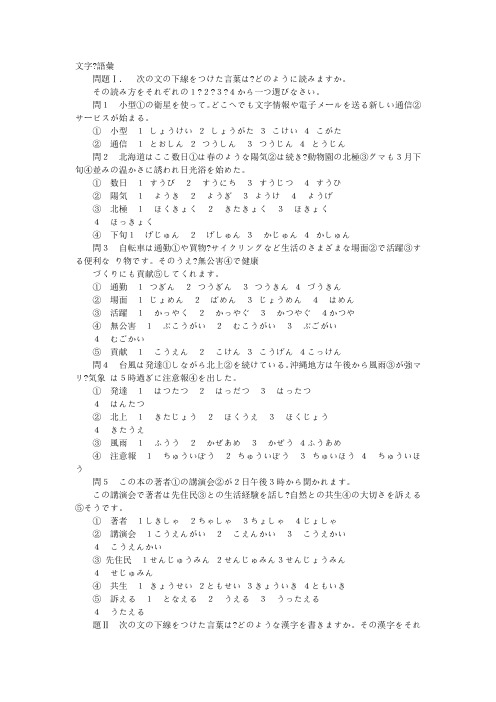
文字?語彙問題Ⅰ.次の文の下線をつけた言葉は?どのように読みますか。
その読み方をそれぞれの1?2?3?4から一つ選びなさい。
問1小型①の衛星を使って。
どこへでも文字情報や電子メールを送る新しい通信②サービスが始まる。
①小型1しょうけい2しょうがた3こけい4こがた②通信1とおしん2つうしん3つうじん4とうじん問2北海道はここ数日①は春のような陽気②は続き?動物園の北極③グマも3月下旬④並みの温かさに誘われ日光浴を始めた。
①数日1すうび2すうにち3すうじつ4すうひ②陽気1ようき2ようぎ3ようけ4ようげ③北極1ほくきょく2きたきょく3ほきょく4ほっきょく④下旬1げじゅん2げしゅん3かじゅん4かしゅん問3自転車は通勤①や買物?サイクリングなど生活のさまざまな場面②で活躍③する便利なり物です。
そのうえ?無公害④で健康づくりにも貢献⑤してくれます。
①通勤1つぎん2つうぎん3つうきん4づうきん②場面1じょめん2ばめん3じょうめん4はめん③活躍1かっやく2かっやぐ3かつやぐ4かつや④無公害1ぶこうがい2むこうがい3ぶごがい4むごかい⑤貢献1こうえん2こけん3こうげん4こっけん問4台風は発達①しながら北上②を続けている。
沖縄地方は午後から風雨③が強マリ?気象は5時過ぎに注意報④を出した。
①発達1はつたつ2はっだつ3はったつ4はんたつ②北上1きたじょう2ほくうえ3ほくじょう4きたうえ③風雨1ふうう2かぜあめ3かぜう4ふうあめ④注意報1ちゅういぼう2ちゅういぽう3ちゅいほう4ちゅういほう問5この本の著者①の講演会②が2日午後3時から開かれます。
この講演会で著者は先住民③との生活経験を話し?自然との共生④の大切さを訴える⑤そうです。
①著者1しきしゃ2ちゃしゃ3ちょしゃ4じょしゃ②講演会1こうえんがい2こえんかい3こうえかい4こうえんかい③ 先住民1せんじゅうみん2せんじゅみん3せんじょうみん4せじゅみん④共生1きょうせい2ともせい3きょういき4ともいき⑤訴える1となえる2うえる3うったえる4うたえる題Ⅱ次の文の下線をつけた言葉は?どのような漢字を書きますか。
n2模拟试题

由于N2模拟试题属于具体学科试题,这里提供一份一般的模拟试题及其回答供你参考:选择题:以下哪个选项不属于日语N2的词汇范畴?A. 阿拉伯数字B. 古代日本的茶道C. 日本的传统节日D. 现代日本流行音乐答案:A. 阿拉伯数字。
阿拉伯数字属于世界通用的数学符号,不属于日语N2的词汇范畴。
简答题:请用日语解释一下“桜”(樱花)这个词在日本的象征意义。
答案:樱花在日本的象征意义非常丰富。
它是春天的重要标志之一,代表着新生命的开始和美好时光的来临。
在日本文化中,樱花经常被用来象征美丽、短暂和无常。
每年樱花盛开的时候,人们会聚在一起欣赏樱花,这已经成为一种传统,也是日本人表达友情、爱情和感谢之情的方式之一。
阅读理解:问题:本文主要讲述了什么?答案:本文主要讲述了日本樱花的特点和象征意义。
推理判断题:根据文章内容,以下哪项是正确的?A. 日本的樱花只有在春天才能看到。
B. 日本的樱花是一种非常美丽的植物。
C. 日本的樱花是日本特有的植物。
答案:B. 日本的樱花是一种非常美丽的植物。
虽然文章中提到了樱花的特点和象征意义,但最直接、最简洁的答案是在文章中可以直接找到的。
根据文章内容,可以得出结论,日本的樱花是一种非常美丽的植物。
听力题:以下哪句话是正确的? A. “你为什么喜欢看日本电影?” B. “你喜欢看日本电影吗?”C. “你喜欢看日本电视节目吗?”日语N2的听力题需要我们听懂比较复杂的句子和对话,并从中提取正确信息。
因此,我们需要从A和B中选择一个正确的句子。
由于选项A中的问题不够明确,我们需要从B中选择一个正确的选项。
因此,答案是B. “你喜欢看日本电影吗?”。
写作题:请用日语写一篇短文,介绍日本的传统艺术——茶道。
答案:茶道是日本传统艺术的重要组成部分,它代表着日本文化的精髓之一。
茶道不仅是一种仪式,也是一种交流和享受的过程。
通过茶道,人们可以更好地了解日本的文化和传统,也可以更好地理解日本人的礼仪和尊重他人的精神。
2010-12-日语能力考试N2真题
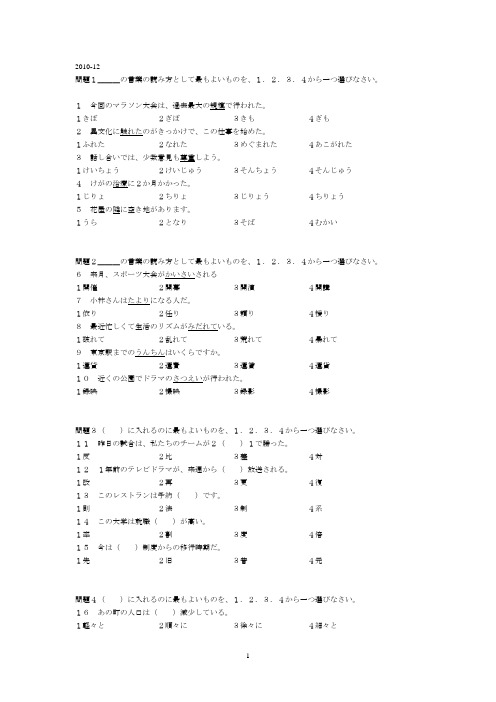
2010-12問題1___の言葉の読み方として最もよいものを、1.2.3.4から一つ選びなさい。
1今回のマラソン大会は、過去最大の規模で行われた。
1きぼ2ぎぼ3きも4ぎも2異文化に触れたのがきっかけで、この仕事を始めた。
1ふれた2なれた3めぐまれた4あこがれた3話し合いでは、尐数意見も尊重しよう。
1けいちょう2けいじゅう3そんちょう4そんじゅう4けがの治療に2か月かかった。
1じりょ2ちりょ3じりょう4ちりょう5花屋の隣に空き地があります。
1うら2となり3そば4むかい問題2___の言葉の読み方として最もよいものを、1.2.3.4から一つ選びなさい。
6来月、スポーツ大会がかいさいされる1開催2開幕3開演4開講7小林さんはたよりになる人だ。
1依り2任り3頼り4援り8最近忙しくて生活のリズムがみだれている。
1破れて2乱れて3荒れて4暴れて9東京駅までのうんちんはいくらですか。
1運貸2運費3運賃4運貨10近くの公園でドラマのさつえいが行われた。
1録映2撮映3録影4撮影問題3()に入れるのに最もよいものを、1.2.3.4から一つ選びなさい。
11昨日の試合は、私たちのチームが2()1で勝った。
1反2比3差4対121年前のテレビドラマが、来週から()放送される。
1改2再3更4復13このレストランは予約()です。
1則2法3制4系14この大学は就職()が高い。
1率2割3度4倍15今は()制度からの移行時期だ。
1先2旧3昔4元問題4()に入れるのに最もよいものを、1.2.3.4から一つ選びなさい。
16あの町の人口は()減尐している。
1軽々と2順々に3徐々に4細々と17最近、物価が()している。
1増加2上達3増大4上昇18多くの人が旅行する()は、飛行機のチケットが高い。
1シリーズ2タイム3シーズン4チャンス19私の上司はとても()で、今まで怒ったのを見たことがない。
1優良2温暖3良性4温厚20この数カ月、新しいゲームが()発売されている。
日本语能力试験模拟テスト一
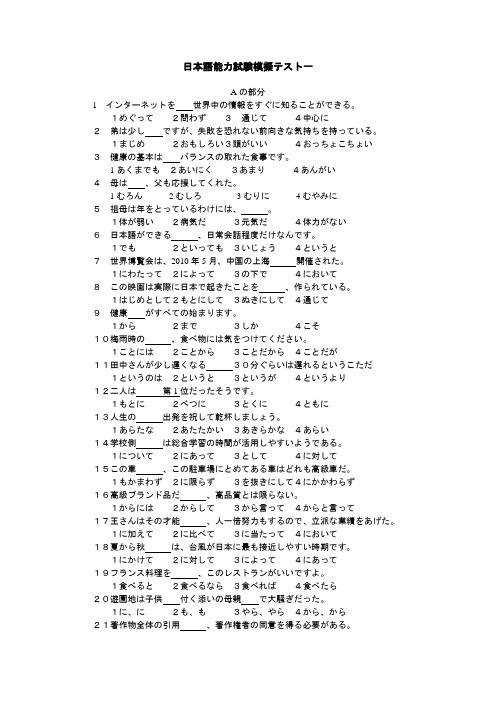
日本語能力試験模擬テスト一Aの部分1インターネットを世界中の情報をすぐに知ることができる。
1めぐって2問わず3通じて4中心に2弟は少しですが、失敗を恐れない前向きな気持ちを持っている。
1まじめ2おもしろい3頭がいい4おっちょこちょい3健康の基本はバランスの取れた食事です。
1あくまでも2あいにく3あまり4あんがい4母は、父も応援してくれた。
1むろん2むしろ3むりに4むやみに5祖母は年をとっているわけには、。
1体が弱い2病気だ3元気だ4体力がない6日本語ができる、日常会話程度だけなんです。
1でも2といっても3いじょう4というと7世界博覧会は、2010年5月、中国の上海開催された。
1にわたって2によって3の下で4において8この映画は実際に日本で起きたことを、作られている。
1はじめとして2もとにして3ぬきにして4通じて9健康がすべての始まります。
1から2まで3しか4こそ10梅雨時の、食べ物には気をつけてください。
1ことには2ことから3ことだから4ことだが11田中さんが少し遅くなる30分ぐらいは遅れるというこただ1というのは2というと3というが4というより12二人は第1位だったそうです。
1もとに2べつに3とくに4ともに13人生の出発を祝して乾杯しましょう。
1あらたな2あたたかい3あきらかな4あらい14学校側は総合学習の時間が活用しやすいようである。
1について2にあって3として4に対して15この車、この駐車場にとめてある車はどれも高級車だ。
1もかまわず2に限らず3を抜きにして4にかかわらず16高級ブランド品だ、高品質とは限らない。
1からには2からして3から言って4からと言って17王さんはその才能、人一倍努力もするので、立派な業績をあげた。
1に加えて2に比べて3に当たって4において18夏から秋は、台風が日本に最も接近しやすい時期です。
1にかけて2に対して3によって4にあって19フランス料理を、このレストランがいいですよ。
【史上最全】日语能力考试N2N3二级文法问题集【1293题】
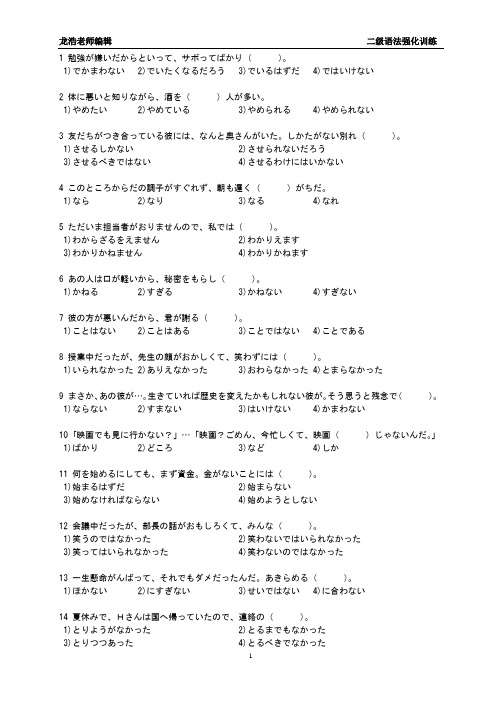
1 勉強が嫌いだからといって、サボってばかり()。
1)でかまわない 2)でいたくなるだろう 3)でいるはずだ 4)ではいけない2 体に悪いと知りながら、酒を()人が多い。
1)やめたい 2)やめている 3)やめられる 4)やめられない3 友だちがつき合っている彼には、なんと奥さんがいた。
しかたがない別れ()。
1)させるしかない 2)させられないだろう3)させるべきではない 4)させるわけにはいかない4 このところからだの調子がすぐれず、朝も遅く()がちだ。
1)なら 2)なり 3)なる 4)なれ5 ただいま担当者がおりませんので、私では()。
1)わからざるをえません 2)わかりえます3)わかりかねません 4)わかりかねます6 あの人は口が軽いから、秘密をもらし()。
1)かねる 2)すぎる 3)かねない 4)すぎない7 彼の方が悪いんだから、君が謝る()。
1)ことはない 2)ことはある 3)ことではない 4)ことである8 授業中だったが、先生の顔がおかしくて、笑わずには()。
1)いられなかった 2)ありえなかった 3)おわらなかった 4)とまらなかった9 まさか、あの彼が…。
生きていれば歴史を変えたかもしれない彼が。
そう思うと残念で()。
1)ならない 2)すまない 3)はいけない 4)かまわない10 「映画でも見に行かない?」…「映画?ごめん、今忙しくて、映画()じゃないんだ。
」 1)ばかり 2)どころ 3)など 4)しか11 何を始めるにしても、まず資金。
金がないことには()。
1)始まるはずだ 2)始まらない3)始めなければならない 4)始めようとしない12 会議中だったが、部長の話がおもしろくて、みんな()。
1)笑うのではなかった 2)笑わないではいられなかった3)笑ってはいられなかった 4)笑わないのではなかった13 一生懸命がんばって、それでもダメだったんだ。
あきらめる()。
1)ほかない 2)にすぎない 3)せいではない 4)に合わない14 夏休みで、Hさんは国へ帰っていたので、連絡の()。
2011年12月N2日语能力考真题

(2011-12)N2言語知識(文字・語彙・文法)・読解(105分)問題1___の言葉の読み方として最もよいものを、1・2・3・4から一つ選びなさい。
この大学は地元の学生が多い1ちげん2ちもと3じけん4じもと両国経済的に密接な関係にある1ひっせつ2みつせつ3みっせつ4ひつせつ野菜にはビタミンが豊富に含まれている。
1のうふ2ほうふう3ほうふ4のうふう実力が足りないところは、努力で補いたい1やしないたい2すくいたい3かばいたい4おぎないたいみなさんの率直な考えを聞かせてください1そつじき2りつじき3そっちょく4りっちょく問題2___の言葉を漢字で書くとき、最もよいものを1・2・3・4からひとつ選びなさい。
彼女の生き方は多くの人に感動をあたえた1与えた2授えた3贈えた4供えたこの公園は市がかんりしている1管利2管理3官利4官理この国はふくしが充実している1福施2副施3副詞4福祉テレビで外国語教育についてのとうろんが行われた1討諭2討論3投論4投諭この二つの会社は、同じ企業グループにぞくしている1 続して2属して3族して4束して問題3()に入れるのに最もよいものを、1・2・3・4からひとつ選びなさい。
あの小説家は数々の文学()を獲得している1賞2位3号4段今回は()条件がいくつも重ねってしまって、大変だった1苦2悪3損4劣クリーム()になるまで、バターと砂糖をよく混ぜてください1流2似3態4状父は一日に()ジョギングをしている1かけ2あき3ぬけ4おき()シーズンは、あの選手の活躍が楽しみだ1明2迎3来4越問題4()に入れるのに最もよいものを、1・2・3・4からひとつ選びなさい。
ストレスを()するために、何かしていますか1解消2削除3減量4停止生活習慣を()してから、ほとんど病気をしなくなりました1訂正2変換3整備4改善申し込みの締め切りは明日に()いる1迫って2限って3寄って4至って日曜だから込んでいるかと思ったけど、()すいているね1たいして2どうりで3わりと4よけい組織のトップに立つ人間は、広い()を持つことが必要だ1視界2視野3視線4視察シャワーを浴びたら、体も気分も()した1さらさら2きらきら3さっぱり4きっぱりこの携帯電話には、いろいろな()がついている1効用2才能3機能4効力問題5___の言葉に意味が最も近いものを、1・2・3・4から一つ選びなさい。
2013年7月N2日语能力等级考试真题

2013年7月N2日语能力考试真题文字·語彙問題1 _____の言葉の読み方として最もよいものを、1・2・3・4から一つ選びなさい。
1.新聞を読めば、世の中の動きを知ることができる。
1、よのなか2、せのなか3、ようのなか4、せいのなか2.新入生をサークルに勧誘した。
•かんゆ•かんげい•かんゆう•かんげ3.当日必要な資料などについても改めてご連絡します。
•たしかめて•あらためて•まとめて•ふくめて4.海外市場に進出するために販売部門を拡充した。
•こうじゅ•かくじゅ•こうじゅう•かくじゅう5.教師は生徒の模範となるような行動をとるべきだ。
•もうほん•もうはん•もほん•もはん問題2 ___の言葉を漢字で書くとき、最もよいものを、1・2・3・4から一つ選びなさい。
6.食費をこれ以上けずることはできない。
•縮る•減る•略•削る7.今学期のこうぎは来週までです。
•構義•講議•講義•構議8.いつのまにか看板がかたむいていた。
•傾いて•頃いて•倒いて•到いて9.自分に与えられた役割をしっかりはたすつもりだ。
•果たす•務たす•担たす•任たす10.今度は田中さんもしょうたいするつもりです。
•招待•招介•紹介•紹待問題3 ( )に入れるのに最もよいものを、1・2・3・4から一つ選びなさい。
11.初めて出た大会で()決勝まで進むことができた。
•前•副•次•準12.このレストランは、いつも親子()の客で込んでいる。
•添え•連れ•伴い•付き13.日当たりが悪いので、この部屋は昼でも()暗い。
•浅•軽•薄•弱14.子供が風邪()なので、今日は学校を休ませることにした。
•気味•具合•寄り•向き15.食器()は、この箱に詰めてください。
•型•種•属•類問題4 ( )に入れるのに最もよいものを、1・2・3・4から一つ選びなさい。
16.駅前を歩いていたら、テレビのリポーターに突然()、インタビューを受けた。
•聞き取られて•呼び止められて•問い合わせられて•見分けられて17.明日のハイキングは午前10時集合、午後4時()の予定です。
日语能力考N2读解练习652

日语能力考N2读解练习652
小编为大家带来一篇日语能力考N2读解练习与讲解,希望能帮助备考N2的考生做阅读专项练习,攻下能力考阅读大关,不要错过这个系列哦。
駿河湾や富山湾のように、海底の地形が険しくて、深海が海岸にせまっている海では、深海魚がきし近く、しかも界面近くでとれる。
少なくとも、1年のうちのある季節には、海の底から湧いてくるみたいに、毎晩のように、深海魚の群れが海の表面に上がってくる。
深海魚というのは、一般には「海の深いところに棲んでいる魚」だと思われている。
それも間違いではないが、少し言葉が足りない。
あるいは、少し誤解されている。
「深い海に棲む魚」を深海魚というのであって、棲んでいる深さ範囲はさまざま、と考えほうが正しい。
筆者の考えでは、「深海魚」とはどういう魚のことか。
1、海にさまざまな範囲の深さに棲む魚。
2、海に深いところに棲んでいる魚。
3、深い海に棲む魚。
4、深海の地形の険しい海に棲んでいる魚。
答案:3
「深い海に棲む魚」を深海魚というのであって、棲んでいる深さ範囲はさまざま、と考えほうが正しい。
最后一句。
”生活在深海的鱼“叫作深海鱼,我们应该知道他们栖息的深度及范围有所不同。
以上就是日语能力日语能力考N2读解练652的相关内容,阅读没有更好的办法,基本知识掌握牢固的前提下要多做练习,把握做题规律,祝各考生取得一个好成绩。
日语能力测试2级模考及答案
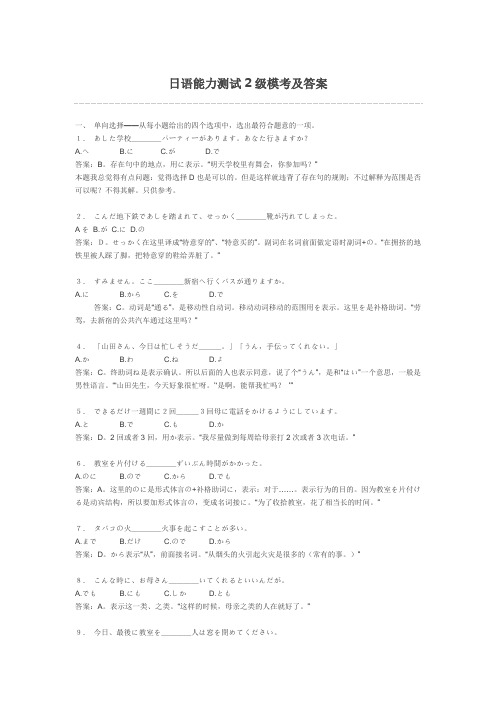
日语能力测试2级模考及答案一、单向选择——从每小题给出的四个选项中,选出最符合题意的一项。
1.あした学校____パーティーがあります。
あなた行きますか?A.へB.にC.がD.で答案:B。
存在句中的地点,用に表示。
“明天学校里有舞会,你参加吗?”本题我总觉得有点问题:觉得选择D也是可以的。
但是这样就违背了存在句的规则;不过解释为范围是否可以呢?不得其解。
只供参考。
2.こんだ地下鉄であしを踏まれて、せっかく____靴が汚れてしまった。
AをB.がC.にD.の答案:D。
せっかく在这里译成“特意穿的”、“特意买的”。
副词在名词前面做定语时副词+の。
“在拥挤的地铁里被人踩了脚,把特意穿的鞋给弄脏了。
”3.すみません。
ここ____新宿へ行くバスが通りますか。
A.にB.からC.をD.で答案:C。
动词是“通る”,是移动性自动词。
移动动词移动的范围用を表示。
这里を是补格助词。
“劳驾,去新宿的公共汽车通过这里吗?”4.「山田さん、今日は忙しそうだ___。
」「うん,手伝ってくれない。
」A.かB.わC.ねD.よ答案:C。
终助词ね是表示确认。
所以后面的人也表示同意,说了个“うん”,是和“はい”一个意思,一般是男性语言。
“…山田先生,今天好象很忙呀。
‟…是啊,能帮我忙吗?‟”5.できるだけ一週間に2回___3回母に電話をかけるようにしています。
A.とB.でC.もD.か答案:D。
2回或者3回,用か表示。
“我尽量做到每周给母亲打2次或者3次电话。
”6.教室を片付ける____ずいぶん時間がかかった。
A.のにB.のでC.からD.でも答案:A。
这里的のに是形式体言の+补格助词に,表示:对于……。
表示行为的目的。
因为教室を片付ける是动宾结构,所以要加形式体言の,变成名词接に。
“为了收拾教室,花了相当长的时间。
”7.タバコの火____火事を起こすことが多い。
A.までB.だけC.のでD.から答案:D。
から表示“从”,前面接名词。
“从烟头的火引起火灾是很多的(常有的事。
jlptn2模拟试题
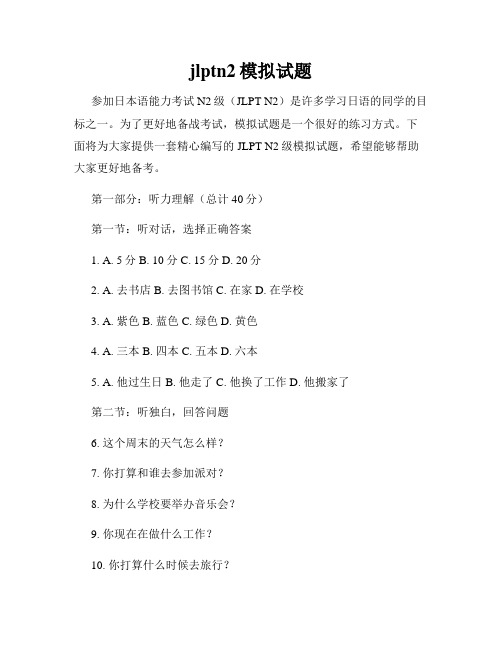
jlptn2模拟试题参加日本语能力考试N2级(JLPT N2)是许多学习日语的同学的目标之一。
为了更好地备战考试,模拟试题是一个很好的练习方式。
下面将为大家提供一套精心编写的JLPT N2级模拟试题,希望能够帮助大家更好地备考。
第一部分:听力理解(总计40分)第一节:听对话,选择正确答案1. A. 5分 B. 10分 C. 15分 D. 20分2. A. 去书店 B. 去图书馆 C. 在家 D. 在学校3. A. 紫色 B. 蓝色 C. 绿色 D. 黄色4. A. 三本 B. 四本 C. 五本 D. 六本5. A. 他过生日 B. 他走了 C. 他换了工作 D. 他搬家了第二节:听独白,回答问题6. 这个周末的天气怎么样?7. 你打算和谁去参加派对?8. 为什么学校要举办音乐会?9. 你现在在做什么工作?10. 你打算什么时候去旅行?第二部分:语法与词汇(总计30分)11. 昨天下雨了,否则我们 ( ) 去上海。
A. 会B. 就会C. 就D. 就要12. 这个车站 ( ) 咖啡馆特别好喝的咖啡。
A. 卖B. 有C. 在D. 对13. 哥哥 ( ) 工作,一直到很晚。
A. 正在B. 已经C. 要D. 到底14. 星期四我 ( ) 一天待在家里。
A. 不得不B. 宁愿C. 本来D. 一般15. 明天下午,我 ( ) 时间和你一起去逛街。
A. 有B. 有了C. 有空 C. 有点第三部分:阅读理解(总计30分)请阅读下面的短文,然后根据短文内容选择正确答案。
夏天是个去旅行的好时候。
大家都想去旅游,农历的七月十五这天,是中国传统节日中元节。
在这天之前,大家要准备东西,比如食品,香烛等。
当然还有金银纸,可以代表金银财宝。
在这天晚上,人们都会去外地祭拜祖先。
七月十五的晚上,也是晒情人的日子。
在这天晚上,大家还可以挂起一扇灯笼,等候那天上的亲人的到来。
16. 夏天去旅行的好时候是?A. 春天B. 冬天C. 秋天D. 夏天17. 七月十五是哪个中国传统节日?A. 端午节B. 中元节C. 元宵节D. 中秋节18. 在中元节前要做什么?A. 准备金银装B. 准备灯笼C. 准备食品,香烛等D. 准备舞龙表演19. 七月十五的晚上人们会做什么?A. 收拾房间B. 准备行李C. 祭拜祖先D. 回家过夜20. 文中提到的晒情人是指?A. 晒太阳B. 晚上散步C. 晒衣服D. 晒月光第四部分:写作(总计20分)请根据以下题目,写一篇150字以上的短文。
N2日语能力考试 1991年到1999年 词汇和文法题(附答案)
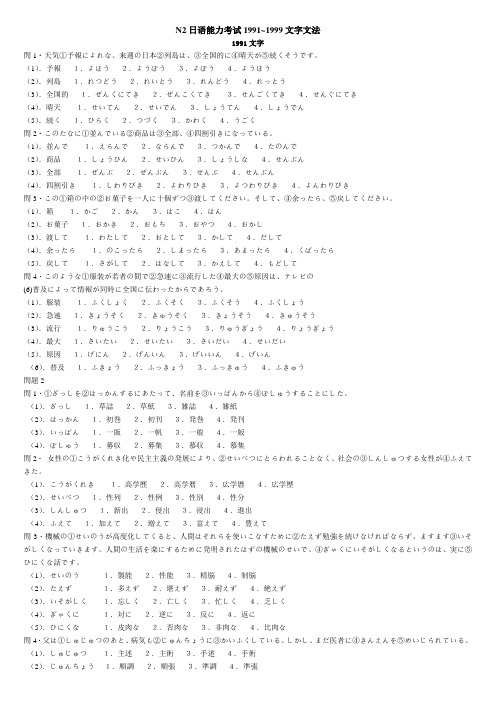
N2日语能力考试1991~1999文字文法1991文字問1・天気①予報によれな、来週の日本②列島は、③全国的に④晴天が⑤続くそうです。
(1).予報1.よほう2.ようぼう3.よぼう4.ようほう(2).列島1.れつどう2.れいとう3.れんどう4.れっとう(3).全国的1.ぜんくにてき2.ぜんこくてき3.せんごくてき4.せんぐにてき(4).晴天1.せいてん2.せいでん3.しょうてん4.しょうでん(5).続く1.ひらく2.つづく3.かわく4.うごく問2・このたなに①並んでいる②商品は③全部、④四割引きになっている。
(1).並んで1.えらんで2.ならんで3.つかんで4.たのんで(2).商品1.しょうひん2.せいひん3.しょうしな4.せんぶん(3).全部1.ぜんぶ2.ぜんぶん3.せんぶ4.せんぶん(4).四割引き1.しわりびき2.よわりひき3.よつわりびき4.よんわりびき問3・この①箱の中の②お菓子を一人に十個ずつ③渡してください。
そして、④余ったら、⑤戻してください。
(1).箱1.かご2.かん3.はこ4.はん(2).お菓子1.おかき2.おもち3.おやつ4.おかし(3).渡して1.わたして2.おとして3.かして4.だして(4).余ったら1.のこったら2.しまったら3.あまったら4.くばったら(5).戻して1.さがして2.はなして3.かえして4.もどして問4・このような①服装が若者の間で②急速に③流行した④最大の⑤原因は、テレビの(6)普及によって情報が同時に全国に伝わったからであろう。
(1).服装1.ふくしょく2.ふくそく3.ふくそう4.ふくしょう(2).急速1.きょうそく2.きゅうそく3.きょうそう4.きゅうそう(3).流行1.りゅうこう2.りょうこう3.りゅうぎょう4.りょうぎょう(4).最大1.さいたい2.せいたい3.さいだい4.せいだい(5).原因1.げにん2.げんいん3.げいいん4.げいん(6).普及1.ふきょう2.ふっきょう3.ふっきゅう4.ふきゅう問題2問1・①ざっしを②はっかんするにあたって、名前を③いっぱんから④ぼしゅうすることにした。
日语能力等级考试(N2级)全真模拟试题-中大网校

日语能力等级考试(N2级)全真模拟试题总分:188分及格:0分考试时间:155分<P>第一部分语言知识、读解(105分钟)<BR> 1、文字、词汇 包括6种题型。
</P>1、汉字的读音,共20题。
(1)<A href="javascript:;"></A>(2)<A href="javascript:;"></A>(3)<A href="javascript:;"></A>(4)<A href="javascript:;"></A>(5)<A href="javascript:;"></A>(6)<A href="javascript:;"></A>(7)<A href="javascript:;"></A>(8)<A href="javascript:;"></A>(9)<A href="javascript:;"></A>(10)<A href="javascript:;"></A>(11)<A href="javascript:;"></A>(12)<A href="javascript:;"></A>(13)<A href="javascript:;"></A>(14)<A href="javascript:;"></A>(15)<A href="javascript:;"></A>(16)<A href="javascript:;"></A>(17)<A href="javascript:;"></A>(18)<A href="javascript:;"></A>(19)<A href="javascript:;"></A>(20)<A href="javascript:;"></A>2、汉字字形平假词汇的汉字。
新日本语能力测试N2文法全真模拟
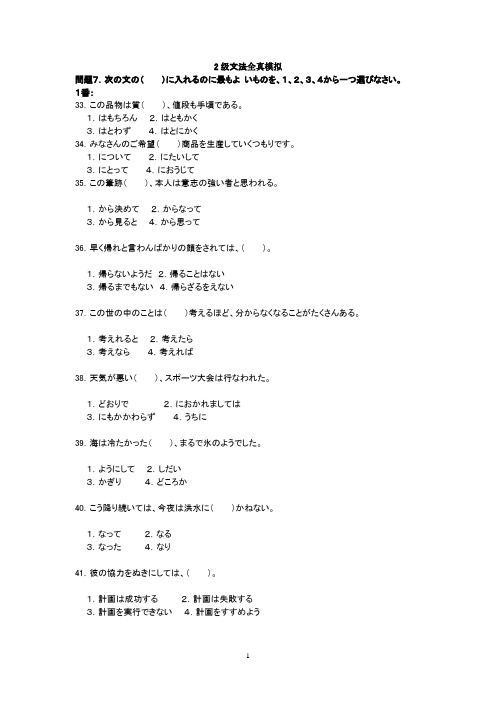
2级文法全真模拟問題7.次の文の()に入れるのに最もよいものを、1、2、3、4から一つ選びなさい。
1番:33.この品物は質()、値段も手頃である。
1.はもちろん2.はともかく3.はとわず4.はとにかく34.みなさんのご希望()商品を生産していくつもりです。
1.について2.にたいして3.にとって4.におうじて35.この筆跡()、本人は意志の強い者と思われる。
1.から決めて2.からなって3.から見ると4.から思って36.早く帰れと言わんばかりの顔をされては、()。
1.帰らないようだ2.帰ることはない3.帰るまでもない4.帰らざるをえない37.この世の中のことは()考えるほど、分からなくなることがたくさんある。
1.考えれると2.考えたら3.考えなら4.考えれば38.天気が悪い()、スポーツ大会は行なわれた。
1.どおりで2.におかれましては3.にもかかわらず4.うちに39.海は冷たかった()、まるで氷のようでした。
1.ようにして2.しだい3.かぎり4.どころか40.こう降り続いては、今夜は洪水に()かねない。
1.なって2.なる3.なった4.なり41.彼の協力をぬきにしては、()。
1.計画は成功する2.計画は失敗する3.計画を実行できない4.計画をすすめよう42.8年前にアメリカで起こった同時多発事件は、誰も予想し()テロ事件だった。
1.うなかった2.えなかった3.できなかった4.なかった43.A:「2012」のようなことが上海では起こったらどうする?B:そんなことはある()。
1.かい2.でも3.まい4.だけ44.日本語能力試験に受かってとても嬉しくて、この喜びを誰かに()にはいられなかった。
1.話さず2.話し3.話して4.話した問題8.次の文の_★_に入る最もよいものを、1、2、3、4から一つ選びなさい。
45.学校にはよくがんばっている____★_______学生もいる。
1.遊んで2.学生も3.いれば4.ばかりいる46.この映画館はハイレベル_★__________ようになっている。
n2全真模拟试题
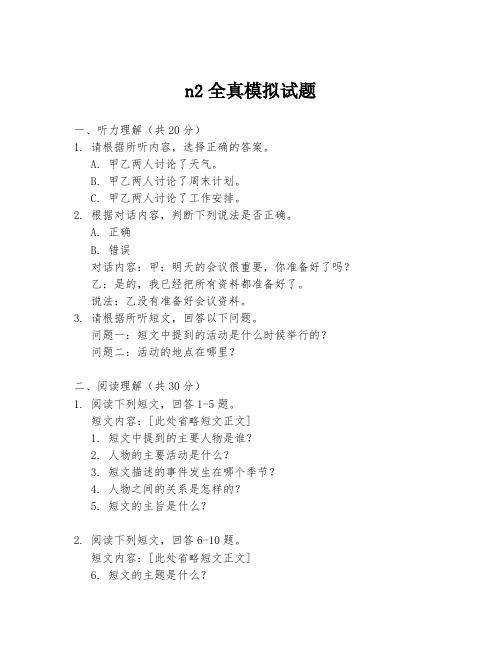
n2全真模拟试题一、听力理解(共20分)1. 请根据所听内容,选择正确的答案。
A. 甲乙两人讨论了天气。
B. 甲乙两人讨论了周末计划。
C. 甲乙两人讨论了工作安排。
2. 根据对话内容,判断下列说法是否正确。
A. 正确B. 错误对话内容:甲:明天的会议很重要,你准备好了吗?乙:是的,我已经把所有资料都准备好了。
说法:乙没有准备好会议资料。
3. 请根据所听短文,回答以下问题。
问题一:短文中提到的活动是什么时候举行的?问题二:活动的地点在哪里?二、阅读理解(共30分)1. 阅读下列短文,回答1-5题。
短文内容:[此处省略短文正文]1. 短文中提到的主要人物是谁?2. 人物的主要活动是什么?3. 短文描述的事件发生在哪个季节?4. 人物之间的关系是怎样的?5. 短文的主旨是什么?2. 阅读下列短文,回答6-10题。
短文内容:[此处省略短文正文]6. 短文的主题是什么?7. 短文中提到的新技术有哪些特点?8. 这项技术对环境有何影响?9. 短文中提到的案例具体是什么?10. 短文作者对这项技术持何种态度?三、语法填空(共20分)1. 阅读下列句子,填入适当的词语或短语。
1. 他_______(非常)喜欢音乐。
2. 尽管天气_______(寒冷),他们还是决定去爬山。
3. 这本书_______(适合)初学者阅读。
4. 她_______(已经)完成了作业。
5. 我们_______(必须)在六点前到达会场。
2. 阅读下列句子,填入适当的语法结构。
6. 他_______(如果)通过了考试,就会去旅行。
7. 她_______(因为)生病,所以没能参加聚会。
8. 我们_______(只要)努力,就能成功。
9. 他_______(虽然)很累,但还是坚持工作。
10. 她_______(直到)完成工作才离开办公室。
四、写作(共30分)1. 请以“我的理想职业”为题,写一篇不少于300字的短文。
提示:你的理想职业是什么?为什么选择这个职业?你将如何为实现这个目标做准备?2. 请根据以下提示,写一篇不少于300字的议论文。
- 1、下载文档前请自行甄别文档内容的完整性,平台不提供额外的编辑、内容补充、找答案等附加服务。
- 2、"仅部分预览"的文档,不可在线预览部分如存在完整性等问题,可反馈申请退款(可完整预览的文档不适用该条件!)。
- 3、如文档侵犯您的权益,请联系客服反馈,我们会尽快为您处理(人工客服工作时间:9:00-18:30)。
新日本語能力試験N2模擬テスト言語知識(文字・語彙・文法)・読解(105分)(文字词汇部分内容摘自《冲刺!新日本语能力考试N2对策・模拟・解析》)問題1の言葉の読み方として最もよいものを、1・2・3・4から一つ選びなさい。
大きな爆発の音に恐怖を覚える。
1こうふ2こふ3きょうふ4きょふ慌しい日々を送る。
1わかわかしい2よわよわしい3はなはだしい4あわただしい休暇を利用して帰省する。
1きせい2きしょう3ぎせい4ぎしょう海に潜って写真を撮る。
1いばって2おごって3おどって4もぐって店員に寸法を測ってもらった。
1すんほう2すんぽう3すいほう4すいぽう問題2____の言葉を漢字で書くとき、最もよいものを、1・2・3・4から一つ選びなさい。
仕事が終わってどうりょうと飲みに行く。
1同職2同事3同仲4同僚両国間の貿易まさつが深刻化してきた。
1摩擦2磨擦3魔察4麻察祖母はしばいを見るのが好きだ。
1支劇2支居3芝劇4芝居この川にゴミをすてないでください。
1投て2捨て3拾て4打てこの1万円札をくずしてください。
1破して2乱して3崩して4散して問題3()に入れるのに最もよいものを、1・2・3・4から一つ選びなさい。
エコカーの多様化で消費者の選択()が広まる一方だ。
1肢2題3形4式親が勉強しろとうるさく言うのは()効果だ。
1低2反3無4逆この道は木が多いため、昼間でも()暗ぐらい。
1浅2薄3白4灰二()三日の九州旅行を計画した。
1泊2住3夜4晩田中さん()に小包を出した。
1向け2宛て3造り4連れ問題4()に入れるのに最もよいものを、1・2・3・4から一つ選びなさい。
卒業後の進路については、()考えてから決めなさい。
1じっくり2めっきり3たちまち4むりやり車のエンジン()で、約束の時間に遅れてしまった。
1バーゲン2トラブル3テント4レシートこの店のラーメンの味は私の()だ。
1好み2味方3喜び4気味彼女の都合で、旅行の日程を二日()ことにした。
1すごす2はなす3めざす4ずらす議論は思わぬ方向へと()した。
1展望2拡大3展開4拡張彼は社長だけあって、物の見方が()。
1するどい2やさしい3はげしい4ひとしい見るなと言われると、()見たくなる。
1割合2余計3案外4始終問題5____の言葉に意味が最も近いものを、1・2・3・4から一つ選びなさい。
午後になって、日差しが一段と強くなった。
1いっそう2せいぜい3にわかに4そろそろ彼の料理はあきれるほどうまい。
1あばれる2おどろく3ついやす4へだてる台風17号はまもなく東京にせっきんする。
1もとづく2ちかづく3いろづく4きづく率直に意見を語ってほしい。
1丁寧に2的確に3適切に4正直にあの音を毎日聞かされるのはたまらない。
1がまんできない2もうしわけない3とんでもない4さしつかえない問題6次の言葉の使い方として最もよいものを、1・2・3・4から一つ選びなさい。
どうやら1ご注文の品をどうやらお送りします。
2どうやら午後は雨になりそうだ。
3私はその事件とはどうやら関係ない。
4時間が経つにつれて、痛みはどうやら消えていった。
返済1借金の返済のため、必死に働いている。
2図書の返済はカウンターで行ってください。
3名前を呼ばれたら、「はい」と返済をしてください。
4返済の際はレシートをお持ちください。
格別1あの人は少し自信格別なところがある。
2 この辺りは格別な建物が立ち並んでいる。
3 彼は監督からいつも格別扱いされている。
4 出来立ての魚料理は格別においしい。
もてなす 1 来週から市民会館で写真展をもてなす。
2 数字をもてなして相手を説得する。
3 心を込めて外国からのお客様をもてなす。
4 連日の大雨は農作物に大きな被害をもてなした。
進出 1 多くの日本企業がインドへの進出を図っている。
2 日本代表は4度目のワールドカップの進出を決めた。
3 大雪のため、飛行機の進出が遅れた。
4 父が部長に進出して、母は大喜びだ。
(文法部分内容摘自《第1考场・新日本语能力考试N2模考(活页版)》)問題7 次の文の( )に入れるのに最もよいものを、1・2・3・4から一つ選びなさい。
喜びも悲しみも互いに分かち合って( )、真の夫婦になれる。
1 以来 2 こそ 3 からでないと 4 ばかりで世界的な金きん融ゆう危機の( )、失しつ業ぎょう率りつは上がる一方だ。
1 あまり 2 すえに 3 もとで 4 せいでこの歌は昔むかし話ばなしを( )作られたものだ。
1 基づいて 2 もとに 3 中心に 4 通して今日はどうもなにか悪いことが起こりそうな気がして( )。
1 ならない 2 きれない 3 たまらない 4 すまない奨学金の申し込み( )、奨学金制度の内容を充分確認した上で、お申込みください。
1にかけては2に限っては3にあたっては4においてはまだ入社3年目で、給料が上がった()、大した金額ではない。
1ばかりか2ものか3といっても4としたら「皆様、本日はご多忙中()、お越しいただきましてありがとうございます。
」1のうちに2からといって3もかまわず4にもかかわらず「鈴木さん、よく食べる()太らないんですね。
何か秘訣でもあるんですか。
」1わりには2としても3かわりに4ことからA「同じものを二つも買ったの?」B「だって、色がきれいでどっちもほしかったんだ()。
」1もん2ほど3わけだ4次第だ転職を機に、今までのことは()忘れて新しいスタートを切りたい。
1なにかと2なにもかも3なんとも4なんと人に見るなと言われると、よけいに()。
1見たくなることだ2見るべきではないものだ3見るべきではないことだ4見たくなるものだ父は家業を継ぐため、大手企業への就職を断だん念ねん()そうだ。
1せずにはいられなかった2せざるをえなかった3してはならなかった4していられなかった問題8次の文の★に入る最もよいものを、1・2・3・4から一つ選びなさい。
今の日本では一般的に、祭りなどの★触れられなくなっている。
1で2伝統文化に3しか4年中行事もっと努力し★、つい怠けてしまう。
1知り2と3つつも4なければならない週末、せっかく海に行ったのに、★ではなかった。
1寒くて2どころ3泳ぐ4意外にサマーキャンプに参加したことで、★、たくさんの友だちもできた。
1知識を2のみならず3いろいろな4得たあの子は★上品だ。
1からして2育ちがいい3だけあって4テーブルマナー問題9よいものを、1・2・3・4から一つ選びなさい。
1しゃべる言葉に違いがあるはずがありません2しゃべるスピードに違いがあるはずがありません3しゃべる言葉が違うのではないでしょうか4しゃべるスピードが違うのではないでしょうか1一方2つまり3単に4ただし1口論する/早口になる2興奮する/ストレスを感じる3早口になる/興奮する4ストレスを感じる/口論する1ところが2とはいえ3そうして4ですから1ようにしてみてはいかがでしょうか2ことができるようになるはずです3ようにしたほうがいいでしょう4ことができないかもしれません(读解部分内容摘自《新日本语能力考试N2全真模拟试题》(解析版))読 解問題10 次の文章を読んで、後の問いに対する答えとして最もよいものを、1・2・3・4から一つ選びなさい。
(1)ロボットは主に工場内の生産現場で使用されているが、建設現場、病院、あるいは家庭においてもその利用が試こころみられつつある。
利用形態としては、ロボットが単独で一つのの作業を実行する方式が多い。
もし、ロボットが人間と協調して一つの作業を実行することが可能であれば、ロボットを利用する範囲が大幅に拡大すると思われ、その意味でも本研究の社会的意義は大きいと考えられる。
(猪岡光「研究成果報告書」による)この研究の背景と目的として、文章の内容と合っているものはどれか。
1 この研究は工場内の生産現場で使用できるロボットの開発を目的としている。
2 この研究はロボットが単独で一つの作業を実行する可能性を検討したものだ。
3 この研究は人間と協力して、作業を実行するロボットの開発を目的としている。
4 この研究は建設現場、病院、家庭において、すでに試行段階に入っている。
(2)私たちは、自分に対しても他人に向かっても、「頑張る」とか、「頑張ろう」「頑張れ」と、しばしば口にする。
しかし、考えてみると、この言葉の意味合いは、かなりあいまいだ。
たとえば、耳の聞こえない子どもに、先生が「頑張れ」と繰り返し声をかけた。
その子はいった。
「わたしは頑張っている。
でも、どこまでやっても、頑張れ、としかいわれない」。
先生は励ましたつもりだろうが、なにを、どの程度、どうすればいいのか、はっきりしない。
「頑張る」は、どこか、せかせかした感じだ。
「頑張れ」には、ときに無神経で残酷な響きがある。
(朝日新聞「天声人語」により改)「頑張れ」には、ときに無神経で残酷な響きがある。
」とあるが、その理由として考えられるものはどれか。
1もともと自分に対して使う言葉で、他人に使う言葉ではないから。
2すでに十分頑張っているのに、もっと要求される感じを受ける言葉だから。
3何をどう頑張ったらいいのか、具体性がないから。
4社会地位や年齢の高いものが、低いものに対して使う言葉だから。
(3)お辞儀が本来であるはずの日本のあいさつに、最近やたらと握手が入り込んでいる。
とりわけ、芸能人や政治家の一部に、親しみをこめた大げさな握手をする人が目立つ。
これは握手が単なるあいさつではなく、親しみの伝達に使われているからだろう。
それが証拠に、パーティ-で出会ったときに握手する人も、別れるときには、握手しない人が多い。
ところが握手の本場の欧米では、握手は「こんにちは」なり、「さようなら」のあいさつに過ぎない。
親しみを特にこめようとするなら、キスしたり、抱き合ったりするだろう。
東洋と西洋では、握手をする時の相手との心理的距離感は違うのだ。
(小倉和夫「握手と拍手」による)「握手をする時の相手との心理的距離感は違うのだ」とあるが、「握手」の意味について、文章の内容と合っているものはどれか。
1日本では相手への親しみの感情を表している。
2日本では出会いの挨拶の気持ちだけを表す。
3欧米では相手への親しみの感情を表している。
4欧米ではただ別れの挨拶の気持ちを表す。
(4)昨今の不景気の波の中で、今や大学を出ても就職が困難になってきた。
苦労して子どもを大学に入れ、高い学費を投資したのに、職にも就けない子どもを抱えて、親の嘆きは深刻である。
最近、大学のあり方について痛切に感ずるところが多々あった。
大学が多すぎるのと、日本の大学は入るまでは詰め込み受験勉強をするが、入ったら最後、学生は遊びにうつつを抜かし(注1)、教師もそういう学生に情熱を失い、形ばかりの講義で義務を果たしたと思ってしまう。
